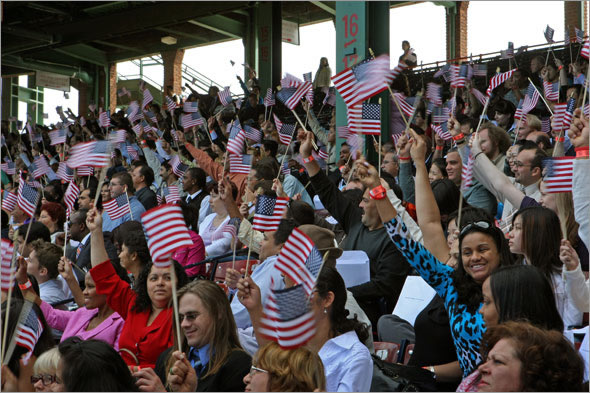
My father became a naturalized citizen in 1951. From start to finish, the paperwork took less than six months for the government to process.
His journey to the United States, the prelude to naturalization, was fraught with danger and discrimination, neither of which deterred him from his mission to provide a modest level of financial support for his mother and siblings living abroad in poverty.
When he was sworn in, he had no idea that one day he would vote in the presidential elections for John F. Kennedy.
Little did he know that a person he voted for would inspire his son, who would one day endeavor to help immigrants earn the citizenship his father cherished.
Naturalization for my dad was a practical choice, not a political calculation.
What Is The Naturalization Backlog?
According to a recent U.S. Citizenship and Immigration Services report, there are 753,000 pending naturalization applications. This represents a 93% increase from 2015.
- At the end of 2015 the citizenship backlog was 390,000.
- By the end of 2016 the total amount of pending cases rose to 640,000.
- The 2017 mid-summer statistics show the backlog has grown by another 113,000 in the following 18 months.
The most obvious impact of a larger caseload, of course, is a longer waiting period.
Currently, the National Partnership For New Americans estimates the nationwide average processing time from submission of a naturalization application to USCIS decision is 12 months, up from the former average of six months.
The wait time varies from office-to-office, and from region-to-region. For instance, in Los Angeles, the wait is now approximately two years.
The Politicization Of Citizenship
Although many immigration activists place the blame on the Trump Administration’s anti-immigrant agenda, the rapidly increasing backlog began under President Obama.
In 2013, the number of naturalization applications totaled 300,000. By 2015, the number of applications reached 800,000. In 2016, more than 1 million citizenship applications were filed.
Much of the growth during that period was related to nationwide citizenship drives. These efforts, as pointed out in Citizenship, Immigrants And Voting: Political Triad For Reform, were largely funded by Democratic Party enthusiasts as part of its’ plan to develop a future base of multi-cultural voters.
The strategy bore some fruits in 2016. Post-election statistics showed that the number of Hispanic and Asian naturalized U.S. citizen voters exceeded that of Hispanics and Asians born in the United States. It’s likely that same trend continued in the recent mid-term 2018 elections.
The strategy is a long-term gambit.
By 2020, ethnic minority youth will outnumber white voters under the age of 18.
By 2045, the United States is projected to become minority-white.
Against this backdrop, immigration advocates decry that the current backlog is politically motivated — an attempt by the Trump administration to deny full civic participation rights to immigrants.
Whether the longer processing times and growing naturalization application backlog is a conscious response to the Democratic Party strategy or not, immigration activists cannot claim innocence in causing the present bureaucratic turmoil.
Rather, in yet another political instance of the teapot calling the kettle black, the degree of mortification is unwarranted.
After all, the self-serving politicization of naturalization, by friend or foe, demeans the heroic efforts of individuals who have overcome numerous obstacles in the hopes of gaining a small measure of personal security and economic opportunity in their lives.
To be sure, I wish all citizens, born in the U.S. or abroad, would exercise their right to vote each and every election.
But naturalization is not a game to be manipulated by whomever is in power for their party’s private gains.
Citizenship is and should remain an end in and of itself, without the push and pull interference of politics.
The Trump Anti-Citizenship Agenda
Permanent residents should not be forced to linger in citizenship limbo on an indefinite basis.
Most of them are longtime law-abiding individuals with solid connections to this country — spouses, families, jobs, and deep community ties. They have already waited 3 years, 5 years, and longer before applying for naturalized citizenship.
For many, taking this step is an unbridled act of personal courage and fortitude.
They merit a fair turn-around time.
The present processing problems, be it caused by bureaucratic incompetence, intentional obstruction, or both is unacceptable.
As a Hemet immigration attorney who has helped guide naturalization clients for over two decades, I have little doubt about the Trump administration’s agenda, especially when the slower pace of processing applications is juxtaposed with other citizenship-related actions taken in recent months – all of which raise serious concerns.
Operation Janus Denaturalization
Is the heightened effort, began under President Bush and accelerated under President Obama, to prosecute, and strip citizenship from individuals suspected of providing misleading information on naturalization applications a mere political red herring or a substantive legal concern?
Efforts To Terminate Military-Based Citizenship
Is the undertaking to disallow immigrants from serving in the military really an attempt to eliminate a viable path to citizenship?
Is the newly-reimplemented challenge to birth certificates from 50, 60, 70 years ago, a smoke screen to revoke citizenship of persons from poorer families by imposing an near impenetrable burden of proof?
Imposition Of Public Charge Rules
Are the expanded rules on public help a callous roadblock to discourage legal immigrants from seeking naturalization?
Conclusion
On the whole, these policies have one common denominator: they all serve to reduce the avenues for obtaining citizenship.
There is another, more insidious effect of such policies. It’s the subtle establishment of fear among immigrants of going forward, of dissuading them from applying to become U.S. citizens, no longer subject to being deported.
During recent months, countless individuals have visited my citizenship and naturalization law office after they have lost their citizenship cases. Often their defeats were avoidable with thoughtful planning and detailed execution.
In an era where naturalization is publicly brandished as a political bridesmaid, the bridge to citizenship is too precarious for immigrants to cross without legal representation.
More now than ever before.
By Carlos Batara, Immigration Law, Policy, And Politics




